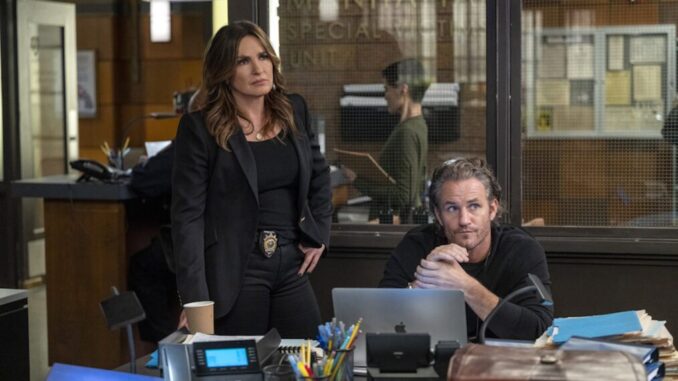
Beneath the Badge: Hargitay Directs a Symphony of Sorrow and Strength in SVU 2025
The harsh fluorescent lights of the interrogation room hummed a discordant tune, mirroring the internal turmoil plaguing Olivia Benson. It was 2025, and SVU, a titan of television, was charting a new course. This wasn’t just another case; this was episode md07, and Mariska Hargitay, seasoned veteran and heart of the show, was at the helm as director. The title, simply “Echoes,” hinted at the episode’s exploration of generational trauma, a theme Hargitay, both as an actress and advocate, had tirelessly championed for years. But beyond the script, beyond the established narrative, lay a palpable shift, a deeper resonance fostered by Hargitay’s understanding of the story’s emotional core.
“Echoes” revolved around Amelia, a young woman who’d been abducted as a child, a chillingly familiar scenario for SVU. But this wasn’t a procedural whodunnit. This was an intricate tapestry woven with the threads of Amelia’s fragmented memories, her struggle to reclaim her narrative, and the lingering shadows cast by her past. From the outset, Hargitay’s direction was marked by a sensitivity that permeated every scene. The camera lingered on Amelia’s trembling hands, the haunted look in her eyes, conveying a vulnerability that words alone couldn’t capture.
We saw Benson, ever the empathetic captain, connecting with Amelia in a way that transcended the typical victim-detective dynamic. Hargitay, understanding the nuanced depth she’d cultivated in Benson over decades, allowed Olivia to be vulnerable herself. A subtle tremor in her voice, a barely perceptible flinch as Amelia recounted her trauma – these small details, born from Hargitay’s intimate knowledge of the character, spoke volumes about the toll these cases took on her. It wasn’t just about solving the crime; it was about bearing witness to the human cost.
One particularly powerful scene took place in the survivor’s support group. Usually a space for raw honesty and shared experiences, Hargitay transformed it into a symphony of sorrow and strength. The camera work was deliberately claustrophobic, reflecting the feeling of being trapped in the past. As each survivor shared their story, Hargitay meticulously framed their faces, highlighting their individual battles and their collective resilience. But it was Amelia’s confession, delivered with a broken voice and tear-filled eyes, that truly resonated. Hargitay’s direction allowed the scene to breathe, allowing the raw emotion to fill the space, drawing the viewer into Amelia’s internal struggle.
Hargitay’s influence extended beyond the actors. The soundtrack was muted, relying heavily on subtle sound cues that amplified the emotional weight of each scene. The use of natural lighting in Amelia’s apartment created a sense of intimacy and vulnerability, highlighting the stark contrast between her present reality and the darkness of her past. Every detail, from the set design to the pacing of the dialogue, was meticulously crafted to serve the emotional narrative.
But the brilliance of “Echoes” lay not just in its emotional depth, but in its exploration of the ripple effect of trauma. The episode delved into the lives of Amelia’s parents, haunted by guilt and the ever-present question of “what if.” Hargitay, through her direction, painted a portrait of a family fractured by tragedy, struggling to rebuild their lives amidst the wreckage of their past. The final scene, a quiet moment between Olivia and Amelia, offered a glimmer of hope. It wasn’t a fairy tale ending; the scars remained, but there was a sense of closure, a promise of healing.
Mariska Hargitay’s direction in “Echoes” wasn’t just about telling a story; it was about bearing witness to the human experience, about understanding the complexities of trauma and the power of resilience. She leveraged her intimate knowledge of the SVU universe, her profound understanding of Olivia Benson, and her unwavering commitment to survivor advocacy to create an episode that was both emotionally resonant and deeply moving. “Echoes” wasn’t just a testament to the enduring power of SVU; it was a testament to the transformative power of empathy, directed by a woman who understood that sometimes, the greatest strength lies in acknowledging the echoes of our pain. It was a reminder that even in the darkest corners of the human experience, hope, like a fragile flame, can still flicker.
